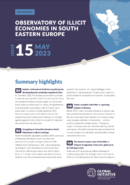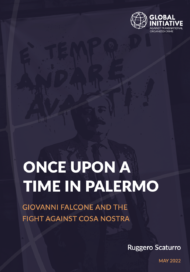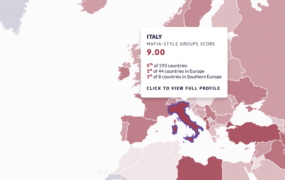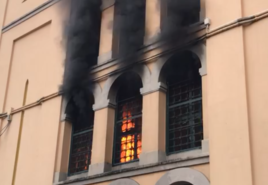Posted on 02 Jun 2023
Scores of mafia group members arrested in northern European joint operation.
On 3 May 2023, a joint operation conducted by law enforcement authorities in eight European countries led to the arrest of over a hundred members of one of the most powerful and impenetrable criminal organizations, the Calabrian-based ‘Ndrangheta. Operation Eureka, which was initiated by the Raggruppamento Operativo Speciale (Special Operations Group, ROS) in Italy’s Reggio Calabria, in collaboration with the Anti-Mafia Investigation Directorate, and supported by Europol and Eurojust, is thought to be the biggest operation ever carried out against the Calabrian mafia in Europe. Yet the large number of arrests does not even tell the full story – Eureka dealt a punishing blow to two of the criminal network’s most powerful ‘ndrine in ‘Ndrangheta parlance – or clans – Nirta-Strangio and Morabito-Bruzzaniti.
The Nirta-Strangio clan, which originates from San Luca, is renowned for ruthless violence. The group is a historical rival of the equally notorious Pelle clan. A long-standing feud between the two culminated in the infamous Duisburg massacre, in which six members of the Pelle ‘ndrina were gunned down in Germany. The Morabito clan, which hails from southern Calabria, has cells in northern Europe, Africa, and Latin America. The clan was headed by Rocco Morabito, one of the most successful drug traffickers in the world, until his arrest in Brazil in 2021. Inquiries into the fugitive Morabito’s activities triggered investigations that would later become Operation Eureka. Particularly notable was an investigation launched in June 2019 in collaboration with the Italian Carabinieri and the Belgian police, which revealed the extent of the linkages between the Nirta-Strangio and Morabito clans, with the former involved in international drug trafficking under Morabito’s brokerage.
Investigations by the Italian Carabinieri, which date back to the 1980s, were initially focused on the Strangio clan but gradually extended to several other mafia ‘families’ from Calabria, including the Morabito family. The investigations tracked financial transactions related to the purchase of large quantities of cocaine; possession of illegal weapons; and money laundering in Italy, France, Portugal, Germany, and Romania to the tune of €25 million. Profits, primarily from cocaine trafficking from Latin America to Europe, were laundered through real estate, restaurants other commercial assets.
As the ‘Ndrangheta’s ‘ambassador’ in Latin America, Rocco Morabito relied on a network of facilitators to provide him with logistical and financial support while a fugitive between 2019 and 2021. Operation Eureka revealed details of Morabito’s activities in cocaine and firearms trafficking. The Morabito clan had arranged a container of Kalashnikovs made in the Soviet Union for the Primeiro Comando da Capital, a Brazilian paramilitary organization. The guns, which were to be supplied by unidentified Pakistani nationals, were offered in exchange for large quantities of cocaine to be shipped to the Calabrian port of Gioia Tauro in January 2021. It is unclear whether the deal was concluded.
Between May 2020 and January 2022, the two ‘Ndrangheta clans allegedly moved six tonnes of cocaine from Colombia to Europe, with almost three tonnes seized by investigators. Through Morabito, the Nirta-Strangio clan would have had direct contact with members of the Clan del Golfo, a Colombian criminal neo-paramilitary group engaged in drug trafficking. The Carabinieri have been able to trace several shipments of cocaine arriving by sea at Gioia Tauro, Antwerp and Rotterdam from Colombia, Brazil, Ecuador and Panama to the ‘Ndrangheta. Some of the cocaine was reportedly sent to Australia, where, according to the assistant commissioner of the Australian Federal Police, the ‘Ndrangheta has been laundering billions of dollars annually through the Australian economy.
Eureka uncovered how, despite being active mainly in its home turf of southern Italy, the ‘Ndrangheta became one of the most formidable criminal groups globally, with operations in over 40 countries. Many of the ‘Ndrangheta affiliates charged in May during the operation were based in Belgium and Germany. In Belgium, the operation led to the arrest of 13 people, seven of whom were issued with European arrest warrants by the Italian judiciary. The operation mobilized a thousand police officers in Germany and 1 400 in Italy, at the request of a Belgian judge who had been investigating the clans’ activities since 2018. In Germany, the 24 arrested members of the San Luca clan had teamed up with Latin American drug trafficking organizations and a group of Albanians with associates in Ecuador, which has developed into a trans-shipment hub for cocaine headed for south-eastern Europe.
According to Anna Sergi, professor of criminology at the University of Essex and a mafia expert, Operation Eureka has enhanced our understanding of the composition of the ‘Ndrangheta. Judging by the number of low-level affiliates arrested, for example, it seems that powerful bosses are still able to keep the foot soldiers power hungry. ‘If you don’t have people who are hungry, you don’t have people who can work for you, or who can go to jail for you,’ said Sergi. This confirms the power that the clans still exercise today in Calabrian communities.
Eureka has revealed the extent of the ‘Ndrangheta’s wider investments across Europe, with Portugal and Romania now also on law enforcement’s radar, in addition to Belgium, Germany and France. At the same time, these investigations have confirmed the predominance of ‘Ndrangheta ‘royalty’ – mainly the Nirta-Strangio and Morabito-Bruzzaniti clans – in cocaine trafficking, not only in terms of logistics, but also for the cash flow needed to pay for big drug shipments. ‘We have known this for more than 20 years,’ said Sergi, but the operation reminds us of why the ‘mafia reputation’ of these groups shows no sign of abating, especially in nodes that are key to international cocaine trafficking where collaboration with other criminal networks is necessary, such as major European ports.
At the same time, the recent crackdown has highlighted the opportunities that lie in effective international police cooperation, which has been vastly improved by enhanced technical expertise in communications technology. Operation Eureka has shown that Eurojust and Europol are able to successfully coordinate multinational investigative teams and promote intelligence sharing, aided by the interception of encrypted messages sent using now-defunct mobile platforms EncroChat and SkyECC.
Penetrating encrypted chats has allowed for a greater understanding of how the operations of organized crime groups in Europe have evolved, and made law enforcement authorities realise that their level of sophistication is greater than they had thought. Furthermore, according to Sergi, the use of technology by investigators has made Eureka ‘a paradigmatic case for all future police operations targeting organized crime’, adding that this is the direction that all investigations on drug trafficking in Europe should take.
An operation such as this should be emulated as a model of how well-managed joint international police efforts can be devastatingly effective – combining intelligence gathering, law enforcement cooperation and targeted technological interventions to disrupt illicit activities and penetrate networks. Although the key figures remain at large, the operation has led to crucial information on the labyrinthine networks of two of the most prominent ‘Ndrangheta clans, extending from Latin America to the Balkans.



